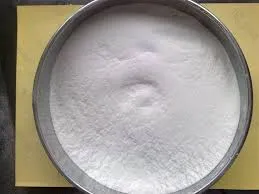
Rgp . 03, 2024 01:09 Back to list
Exploring the Applications and Benefits of Hydroxypropyl Methyl Cellulose in Various Industries
The Role of Hydroxypropyl Methyl Cellulose (HPMC) in Modern Industries
Hydroxypropyl methyl cellulose (HPMC) is a versatile cellulose ether that has gained significant attention across various industries due to its unique properties and functions. As a non-ionic polymer, HPMC is derived from cellulose, a natural polymer found in plant cell walls. The modification and derivation of this cellulose polymer result in a compound that meets the requirements of diverse applications, notably in food, pharmaceuticals, construction, and cosmetics.
Properties of HPMC
HPMC exhibits remarkable solubility in both hot and cold water, forming a clear, viscous solution. This attribute makes it especially valuable in applications requiring consistent viscosity and stability. The degree of hydroxypropyl and methyl substitution can be tailored to achieve desired properties, such as viscosity, gel formation, and thermal stability. As an efficient thickening, emulsifying, and film-forming agent, HPMC is revered for its ability to retain moisture, enhance texture, and improve emulsion stability.
Applications in the Food Industry
In the food sector, HPMC acts as a thickener, stabilizer, and emulsifier, enhancing the texture and shelf-life of various products. It is commonly used in gluten-free baking to improve dough consistency and moisture retention, thereby compensating for the absence of gluten. HPMC is also employed in sauces, dressings, and dairy products to provide optimal viscosity and mouthfeel. Its safety and non-toxic nature make it an approved food additive, further solidifying its role in creating healthier food products.
Pharmaceutical Uses
hydroxypropyl methyl cellulose hpmc

HPMC's significance in the pharmaceutical industry cannot be overstated. It serves multiple functions, such as being a binder in tablet formulations, a controlled-release agent, and a viscosity agent in liquid formulations. In drug delivery systems, HPMC enables the modulation of drug release rates, aiding in achieving therapeutic efficacy. Its biocompatibility and safety profile make it an ideal candidate for pharmaceutical applications, where precision and reliability are paramount.
Contribution to the Construction Industry
In construction, HPMC enhances the performance of cement-based materials. It acts as a water-retention agent that helps maintain workability and prevents cracks in mortars and plasters. The incorporation of HPMC into construction materials improves adhesion, flexibility, and durability, making it an essential additive for manufacturers seeking to produce high-quality building materials. Moreover, it assists in improving the properties of tile adhesives, rendering them more effective and easier to work with.
Cosmetic and Personal Care Sector
HPMC has found its place in the cosmetic industry due to its thickening and emulsifying properties. It is used in formulations for lotions, creams, and gels, where it creates a desirable texture and provides a smooth application. Moreover, HPMC is recognized for its ability to stabilize emulsions, ensuring that cosmetic products maintain their quality over time. Its gentle nature makes it suitable for use in personal care products intended for sensitive skin.
Conclusion
Hydroxypropyl methyl cellulose (HPMC) is an extraordinary compound with multifaceted applications across diverse industries. Its ability to enhance product formulation in food, pharmaceuticals, construction, and cosmetics highlights its significance in modern manufacturing processes. As industries continue to prioritize efficiency, sustainability, and quality, HPMC stands out as a valuable ingredient that meets these evolving demands. Its versatility and safety profile ensure that HPMC will remain integral to various formulations in the years to come, reflecting the ongoing innovation and development in the use of biopolymers in industrial applications.
-
Versatile Hpmc Uses in Different Industries
NewsJun.19,2025
-
Redispersible Powder's Role in Enhancing Durability of Construction Products
NewsJun.19,2025
-
Hydroxyethyl Cellulose Applications Driving Green Industrial Processes
NewsJun.19,2025
-
Exploring Different Redispersible Polymer Powder
NewsJun.19,2025
-
Choosing the Right Mortar Bonding Agent
NewsJun.19,2025
-
Applications and Significance of China Hpmc in Modern Industries
NewsJun.19,2025







